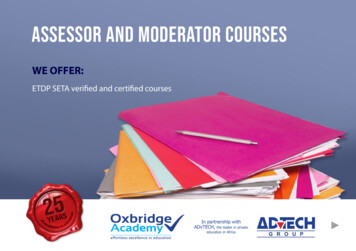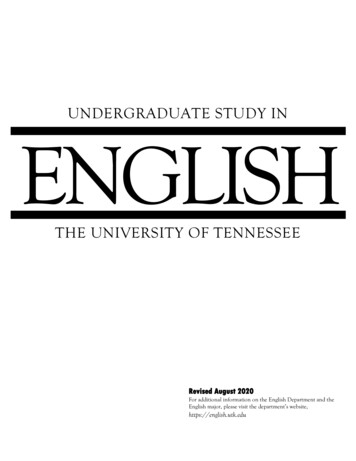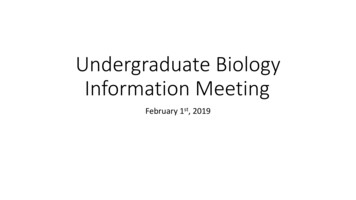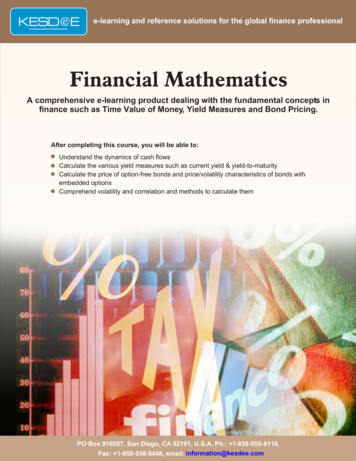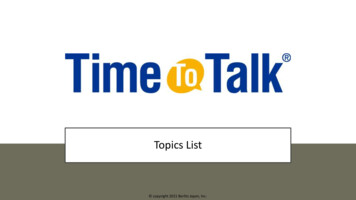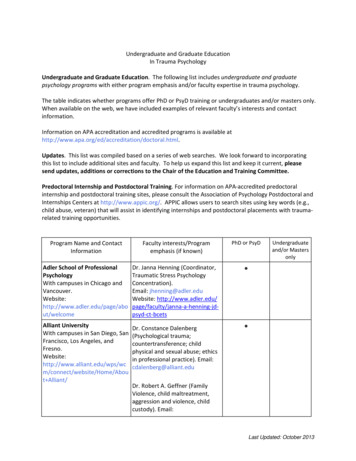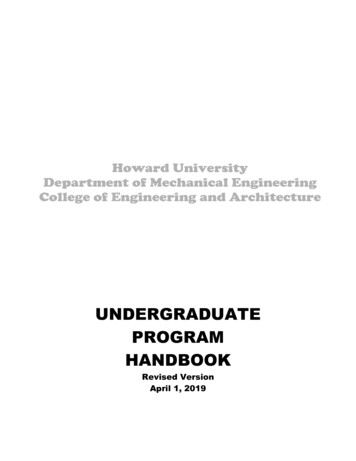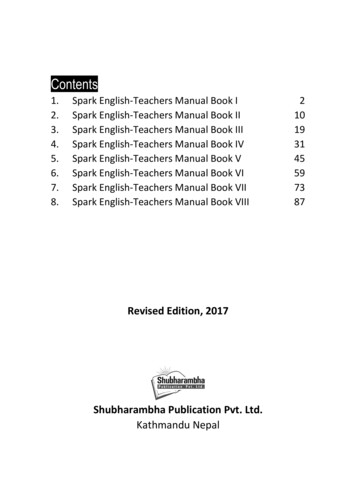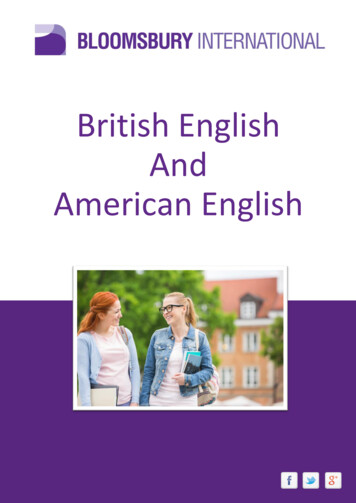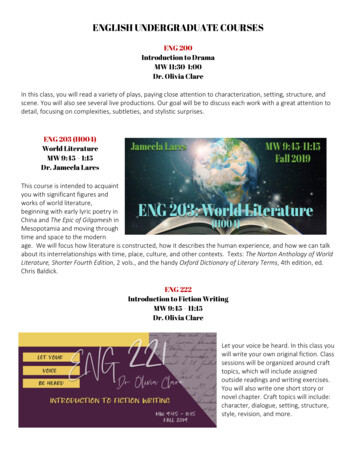
Transcription
ENGLISH UNDERGRADUATE COURSESENG 200Introduction to DramaMW 11:30-1:00Dr. Olivia ClareIn this class, you will read a variety of plays, paying close attention to characterization, setting, structure, andscene. You will also see several live productions. Our goal will be to discuss each work with a great attention todetail, focusing on complexities, subtleties, and stylistic surprises.ENG 203 (H004)World LiteratureMW 9:45 – 1:15Dr. Jameela LaresThis course is intended to acquaintyou with significant figures andworks of world literature,beginning with early lyric poetry inChina and The Epic of Gilgamesh inMesopotamia and moving throughtime and space to the modernage. We will focus how literature is constructed, how it describes the human experience, and how we can talkabout its interrelationships with time, place, culture, and other contexts. Texts: The Norton Anthology of WorldLiterature, Shorter Fourth Edition, 2 vols., and the handy Oxford Dictionary of Literary Terms, 4th edition, ed.Chris Baldick.ENG 222Introduction to Fiction WritingMW 9:45 – 11:15Dr. Olivia ClareLet your voice be heard. In this class youwill write your own original fiction. Classsessions will be organized around crafttopics, which will include assignedoutside readings and writing exercises.You will also write one short story ornovel chapter. Craft topics will include:character, dialogue, setting, structure,style, revision, and more.
ENG 223Introduction to Creative WritingOnlineDr. Adam ClayENG 223 is an introduction to multi-genrecreative writing with an emphasis on fiction,poetry, and creative nonfiction. Students willstudy craft-based guides, read publishedworks, and draft creative work in variousgenres. The class will place an emphasis on generative writing exercises modeled on published work; studentswill also take part in peer-review workshops to develop and revise their writing. The class will culminate in thesubmission of a final portfolio that includes revised creative work, along with a critical introduction reflecting onthe writing process as it applies to fiction, poetry, and creative nonfiction.ENG 301Advanced GrammarTR 4:45-6:15Dr. Shane WoodThis course has been revitalized, even byname. ENG 301: Advanced Grammar,formerly known as “English Grammar,” isfocused on the power and rhetoricalnature of language. We will investigate language and study ideas about language. This class works from theassumption that when we hear the word “grammar,” we think about the prescriptive nature of grammar—rules. Rules that tell us what to do. Or we think about specific parts of speech: nouns, pronouns, adverbs,adjectives, verbs. These concepts often lead us to think about correctness in hopes of meeting some standardnotion of English. But language and grammar are complex. Read this:“See, dont nobody all the time, nor do they in the same way subscribe to or follow standard modes ofexpression. Everybody mix the dialect they learn at home with whateva other dialect or language theylearn afterwards. That’s how we understand accents; that’s how we can hear that some people are froma Polish, Spanish, or French language background when they speak English. It’s how we can tellsomebody is from the South, from Appalachia, from Chicago or any other regional background” Vershawn Ashanti YoungGrammar has power. It can change the way we read. It can change the way we understand because languagehas meaning. This course is devoted to understanding the effects of different approaches to grammar. Everylanguage has a system of governing rules. Studying grammatical rules only takes us so far. We must examineand explore beyond the structural in order to better understand what language does and how grammarsevolve. This course will challenge us to consider the dynamic nature of grammar in an interesting and engagingway.Is grammar boring? No.
ENG 314Popular FictionELEMENTARY, MY DEAR WATSON: DETECTIVE FICTIONMW 11:30-1:00Dr. Alexandra ValintDetective fiction is a genreseemingly obsessed with rules; infact, the members of the 1920sDetective Club actually took anoath to uphold them. And yet,much of the fun in readingdetective fiction is watchingauthors play with and evenupend such rules (such as, thedetective cannot be the criminal). In this course, we will weave between reading influential, historical examplesof detective fiction and exploring more contemporary and global examples across different media (literature,film, TV, podcasts, games). We will start with two authors who indelibly shaped the genre and created thestereotypical detective: Edgar Allan Poe’s Dupin and Arthur Conan Doyle’s Sherlock Holmes (along with hissidekick Watson); we will also consider nineteenth-century female detectives, paying particular attention tohow the gender of the detective affects the investigation and the narrative. We will read “golden age” authorssuch as Agatha Christie and Dorothy Sayers, as well as the hardboiled fiction of Raymond Chandler. The primaryrule of detective fiction is known as “fair play”—the notion that an author must construct the mystery in a waythat allows an observant reader to solve the crime; and yet, detective fiction also revels in tricking andmisleading the reader through false clues, leads, and suspects. Therefore, throughout the course, we will seekto understand how detective fiction works—its conventions, its moves—and how it works on us—its effects, itsthrills, its surprises. We will also be attuned to how issues of gender, class, and race intersect with criminalityand its detection.ENG 330Writing and Communicating in EducationOnlineSherry KinkopfIf your major is related to education or if you areconsidering becoming a teacher, this course is for you. ENG330, Writing and Communicating in Education, is anadvanced composition course aimed at improving aprospective teacher’s ability to communicate with varying audiences and for varying purposes. Throughout thecourse, students will learn about their professional organizations and analyze how they function as discoursecommunities, participate in an extended inquiry project, and explore how teachers use language tocommunicate ideas. To further their understandings of how communication works in the profession,students take an inquiry stance and investigate a current educational issue of their choice and engagein exploring ways to write about what they have learned. Even though the course is online, it is highlyinteractive and students are supported by their peers and their professor to engage in topics and writinggenres. Communication skills are essential for accomplished teaching, and ENG 330 is certain to help theprospective teacher become more confident and competent in many communication contexts.
ENG 319Literary Study of theBibleMW 8:00 – 9:30Dr. Jameela LaresAlthough many studentsknow the Bible as a religioustext, it is also a literary one,and in this course we willdiscover its literary naturemore particularly. We willread such Old Testament genres as epic, hero story, satiric tale, psalm, proverb, encomium, and epithalamium,not to mention the various literary genres of the New Testament. Required texts: the King James Bible andLeland Ryken’s very readable Words of Delight: Literary Introduction to the Bible (2nd edition). I will recommendand have in the bookstore some copies of the Norton critical edition of the King James Version (2 vols.), whichincludes scholarly notes and ancillary materials, but you can also access the KJV in other editions or online.Course requirements: regular reading quizzes and class participation, three longer written assignments, amidterm and a final exam.ENG 400Senior Capstone (H002)On the River: BritishLiterature and RiparianLandscapesTR 9:45-11:15From the Thames to the Congo,rivers in British literature suggestimportant links between nationand nature. This is especially truefor an island nation such as Britain,whose imperial stature was aided in no small part by its mastery of inland and oceanic waterways. This courseexplores rivers as both agents of nationhood and sites for negotiating national and regional identity. How dorivers aid or determine human activity, and vice versa? How does a provincial river like George Eliot’s fictionalFloss differ from an urban behemoth like the Thames, and with what consequences for the landscape and itspeople? More broadly, what might a riparian—i.e., riverbank—literary criticism look like? Readings include TheWind in the Willows, The Mill on the Floss, Heart of Darkness and selected poetry by William Wordsworth andAlice Oswald.
What was modernism? This course pursues this question in an Anglo-Americancontext by surveying works of prose and poetry from mostly the first half of thetwentieth century. Through voices such as Stein, Woolf, Baldwin, Eliot, Hurston, andCage, experimental gestures and tricky emotional truths will receive sustainedattention. Building upon impressionist principles devoted to perceptual immediacy,many modernists conceived of their art as being beyond art. Their work was to beapproached as pure transcriptions of consciousness, a passive recording of things inthemselves. This literary attempt to transcend literature is part of a broader philosophical project that appearsin classical thought, gathers momentum in nineteenth-century French visual culture, and culminates inmodernism—the myth of anti-art. Its legacy remains contemporary writing’s heightened (by now, nearparanoid) self-awareness of its formal scope in a world that, for better or worse, refuses to stand still.ENG 400Senior Capstone(H001)MW 1:15-2:45Dr. Ery ShinENG 410Studies in Ethnic Literature: JewishAmerican LiteratureMW 9:45 – 11:15Dr. Jonathan BarronWhat is the Jewish American literary tradition?Is the literary tradition of the United Statessecular or is it actually Christian? Where doesthe Jewish writer fit in the American literarytradition? In this class, we explore these issuesas we follow the Jewish American tradition from the early 20th-century to the present. Along the way, we’ll readthe Nobel Laureate Saul Bellow along with Bernard Malamud, Cynthia Ozick, Philip Roth, and Grace Paley. We’lllook at fiction and poetry and we’ll also include the recent work of such writers as Nicole Kraus, NathanEnglander, Allegra Goodman, Michael Chabon and Jonathan Safran Foer.ENG 469Studies in British Literature:Heroes, Monsters, and Other Boundary Haunters in Early Medieval LiteratureTR 11:30-1:00Dr. Leah ParkerMedieval boundaries—whether between peoples, places, genres, genders, the lawful andunlawful, human and non-human, heroes and monsters—were not the same as modernboundaries. They differed in ways both subtle and substantial. This course will explore such boundaries throughthe literature of early medieval England. How do Beowulf and other texts in the same manuscript definemonstrosity with and against gender norms, marvelous creatures, distant lands, and the thin border betweenlife and death? How do warriors, saints, powerful young women, and figures of history, myth, and legend cometo be seen as heroes? What new ways of radically reimagining boundaries and transformation—even in ourmodern world—are made possible through sustained analysis of the oldest English literature?Readings will include standard favorites such as Beowulf, The Dream of the Rood, elegies, and riddles, as well asless-commonly-read texts that shed light on the early medieval world and beyond. Take this course to find outwhy Anglo-Saxons were very concerned about Vikings, but perhaps more so about cannibals; what similaritiesearly medieval monks found between human genitalia and various garden vegetables; how one ofShakespeare’s stories traces back to an Old English romance about incest, shipwreck, and clever bath games;and much more!
ENG 418Adolescent Literature: As ManyRoads to Maturity as PossibleMW 1:15-2:45Dr. Jameela LaresBoth children’s and young adult (“YA”)literature favor the narrative. There are,for example, few plays or lyric poemcollections on the solid wall of youngadult literature at Hattiesburg’s Books-aMillion. But though young adult literatureis heavy with plots, characters, andsettings, the genre is not limited to the realistic “problem novel,” though that genre represents some excellenttexts. As we will see in our examination of YA literature (broadly defined as “texts for maturing persons orabout maturation process”), various YA genres represent issues and conflicts in becoming adults, and arguablysome genres represent some of these issues better than others. I hope that we can also make use of theextensive YA holdings in our excellent de Grummond Children’s Literature Collection. Course requirements:Thoughtful reading of texts, regular attendance and participation in seminar discussions; regular blog posts onCanvas; an oral presentation on an additional YA text, along with a short written component; a class facilitation;and a researched seminar paper. This course is being taught concurrently with English 518.Texts will probably include:Brosgol, Anya’s GhostBruchac, Code Talker: A Novel about the Navajo Marines of World War TwoCart, Young Adult Literature: From Romance to Realism, 3rd edition.Heiligman, Vincent and Theo: The Van Gogh BrothersHinton, The OutsidersJones, Fire and HemlockMcCormick, SoldNess, The Knife of Never Letting GoSalinger, The Catcher in the RyeThomas, The Hate U GiveZarins, Sometimes We Tell the Truth
ENG 401 (Gulf Park)Composition Study for TeachersTR 11:30-1:00Dr. Rebecca PowellThis course invites you to study and research how writingis at work in the world, how it moves through your lifeand communities, how people and institutions deploywriting to include and exclude, and finally, but perhapsmost importantly, how to transform and utilize thatknowledge in your teaching and professional endeavors.To do this, we’ll research the role of writing in our culture, education, and communities, examine our ownwriting processes, study the literature on the writing experiences and processes of adolescents, and designlesson plans, activities, and assessments that reflect the labors of our studies.In this course, we define writing broadly, drawing on composition and literacy studies to expand our definitionsof composing beyond the page to the digital and visual. We’ll work together to see how this expansivedefinition of writing will inform our pedagogy and practices and how it does, or does not show up in educationdiscourses about writing, including the professional statements of the National Council of Teachers English andthe Mississippi Career and College Ready Standards. This course is appropriate for elementary and secondaryteacher candidates.ENG 402 (Gulf Park)Literature Study for TeachersTR 1:15-2:45Dr. Rebecca PowellLiterature in the classroom can work as amirror, window, or wall. Recent researchshows correlations between reading forpleasure and improved life outcomes, whichhas sparked calls for “reading as a civilright.” This course explores the teaching ofliterature and reading through the lens ofcivil rights. In the class, students will explorehow to promote independent reading,create diverse reading experiences, andfoster cultures of literacy within schools andthe classroom.
ENG 477 (Gulf Park)American Novel, 1920-60: Genre and FilmW 6:30-9:45Dr. Damon FrankeTaking to heart the essential nature of a survey, this course offers "something for everyone" as it covers apanoply of literary genres: Romantic Comedy, Bildungsroman Drama, Western, Adventure, Southern Gothic,Detective Fiction, and Science Fiction. Additionally, we will read two novels from the 1920s, one from the1930s, two from the 1940s, and two from the 1950s. Anita Loos' brilliant comedy became a vehicle for MarilynMonroe's stardom in Gentlemen Prefer Blondes. Oakley Hall's Western Warlock draws off the myths ofTombstone and developed a cult following of future major authors. Jack Kerouac's landmark road adventurenovel On the Road defined the countercultural spirit of the Beat Generation. Dashiell Hammett's flair forhardboiled detective fiction burst forth in the shocking Red Harvest, which became an inspiration for AkiraKurosawa's Yojimbo. Zora Neale Hurston's Their Eyes Were Watching God remained neglected during thisperiod, but now lets us revisit the African American experience through the perspective of a remarkable womancoming of age in the segregated South. George Stewart captures the fears of the Cold War in his postapocalyptic work of science fiction Earth Abides. To accentuate the fact that these novels are written in thedawning Age of Cinema, we will certainly watch Gentlemen Prefer Blondes, and class will vote on two otherfilmic adaptations to screen. We will read the seven American novels listed above, and students will researchone in order to craft a 10-12 page essay. Students in history, film, psychology, education, political science,geography, and interdiscplinary studies can design their own projects according to their interests. Every studentshould be able to earn an "A." This class can be a course for the English minor, and it satisfies the 400-levelelective and the writing intensive requirements for the major.
ENG 370 (G001 – Gulf Park)American Literature 1THE AMERICAN ORIGIN STORYMW 4:45-6:15Dr. Whitney MartinIn this course, we will explore American literature from itscolonial beginning through 1865, the end of the Civil War. Wewill learn and develop skills for critical textual analysis includingclose reading and engagement with secondary sources. We willconsider the definitions of American identity and the AmericanDream and examine the relationship between literature andthese ideals.
Introduction to Fiction Writing MW 9:45 - 11:15 Dr. Olivia Clare Let your voice be heard. In this class you will write your own original fiction. Class sessions will be organized around craft topics, which will include assigned outside readings and writing exercises. You will also write one short story or novel chapter. Craft topics will include:

